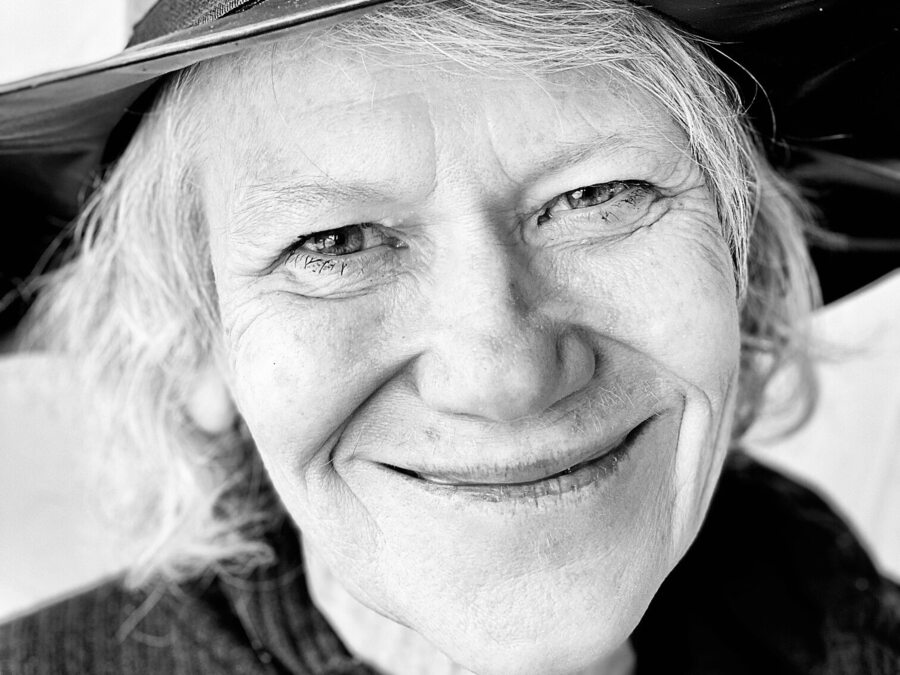For a further gathering of reflections on Jenness’s life and legacy, go here.
Most of us who loved Morgan Jenness have heard her inciting incident. I love to hear how others have heard it, and I loved to hear her tell it, slightly differently, depending on the audience.
A theatre queen in the deep chasms of her soul, she delighted in expressing her calling as something she came to via an inciting incident (as opposed to an apotheosis) because she loved the reason for the journey (as opposed to the climax). Perhaps that’s why she treated each question she asked—as a dramaturg, teacher, and activist—as the liftoff, not the solution.
Here’s a summary of Morgan’s inciting incident: As a young street urchin living with drag queens in 1970s downtown New York City, shuffling around nonprofits, feeling inadequate in her response to this ever growing demon of capitalism, Morgan decided to give herself completely to the work of Mother Teresa. I’d always imagined her making the trek to India, crawling on her knees up a thousand steps, until she reached the feet of a saint. It turns out Mother Teresa just happened to be in town. Morgan got wind of it and, as she would do throughout her life, she showed up.
Our street urchin had the unique ability to find her way into every corner of every room where it was happening, much like a Shakespearean fool—to the degree that if you were in a room and she wasn’t there, it wasn’t happening. So she finagled, or merely walked forward in a direct path, through the security guards and velvet ropes, to the saint herself.
When Morgan told her she wanted to give her life in service to the impoverished souls in India, the answer was no. “In my country,” Teresa explained, “there is a physical famine. But in yours there’s a spiritual one. You need to stay here. The work is here.”
So Morgan did. She dedicated her life to serving our spirits.
How she did that is a story told by the thousands of artists, activists, students, audience members, and community members she found and helped throughout her life. I’m one. Before I’d met Morgan, my encounters with the “legit” American theatre had been constricting, to say the least. I, like so many of us in this relentlessly neoliberal field, were taught (are still taught?) that if we wanted to be cast, read, given access, even considered, that we needed to work within standard tastes, forms, cultures, and economic goals. Curiosity is extremely undervalued in our America.
But then there was Morgan. Morgan was like meeting, not a saint, but the… Muse of Curiosity. “Ingenuity is always worth a read,” was one of her oft-repeated mantras. In essence, she viewed the act of creativity as inherently good. Something worthy of digging into—the product itself, perhaps not, but the act, yes; the verb, not necessarily the noun.
On a personal note, she was the practitioner and parent that didn’t try to squash my queerness but instead saw it as the key to my spirit’s breadth; she never tried to get me to be something or someone else in order to succeed financially or in the world of status. She left me the breadcrumbs to the history of art, ideas, and relief and hope; she fed me and then taught me how to fish; she was the one who showed me, through example, how to show up for the world and the people in it; how one could craft their life and practice as an unraveling of late-stage capitalism; how one could sacrifice the self as a rebellion against the false moral code of the survival of the fittest (otherwise known as winning).
Something Morgan understood like few folks I’ve encountered is that deep in another human’s heart is the desire to be considered. That was her great work: to take the time to love, and so consider and engage with, humans and their creations. She was a magnificent audience member to so many of us oddities. She got on the ride for the most unconventional, wobbly work. She didn’t insist an adventure adhere to her design before agreeing to board. She engaged with every offering. If they weren’t to her liking or hope for the world, rather than a quick dismissal, she would (more often than not) invite you to wonder why, with her. My mantra to myself when we worked together was always, “Take the note.” Maybe later we’d discover it wasn’t germane, but it was always offered as part of the process to the art, not the result.
Here was Morgan’s offering: The end never justifies the means, because there is no end. If the past is prologue, how could an ending be anything but a new question? And so there are only means. There is only how we live, the ethical choices we make, and the care we take and give.
That’s not to say it’s easy. But when in doubt, consider: Morgan managed to wrangle herself, each day, to the almost impossible task of healing the American spirit, all while struggling through years of fragile health and the reality that you don’t become a young street urchin without an overdose of childhood trauma. Through her life she managed to be one of the best of us. Regardless. Despite her challenges. Maybe because of them. It could have been so easy to fall into despair, to the tragedy of our times and our past, unto death.
But to the end, she wasn’t here to reach an ending. Shall we take the note?
Taylor Mac (judy) is a playwright, actor, and performance artist.

